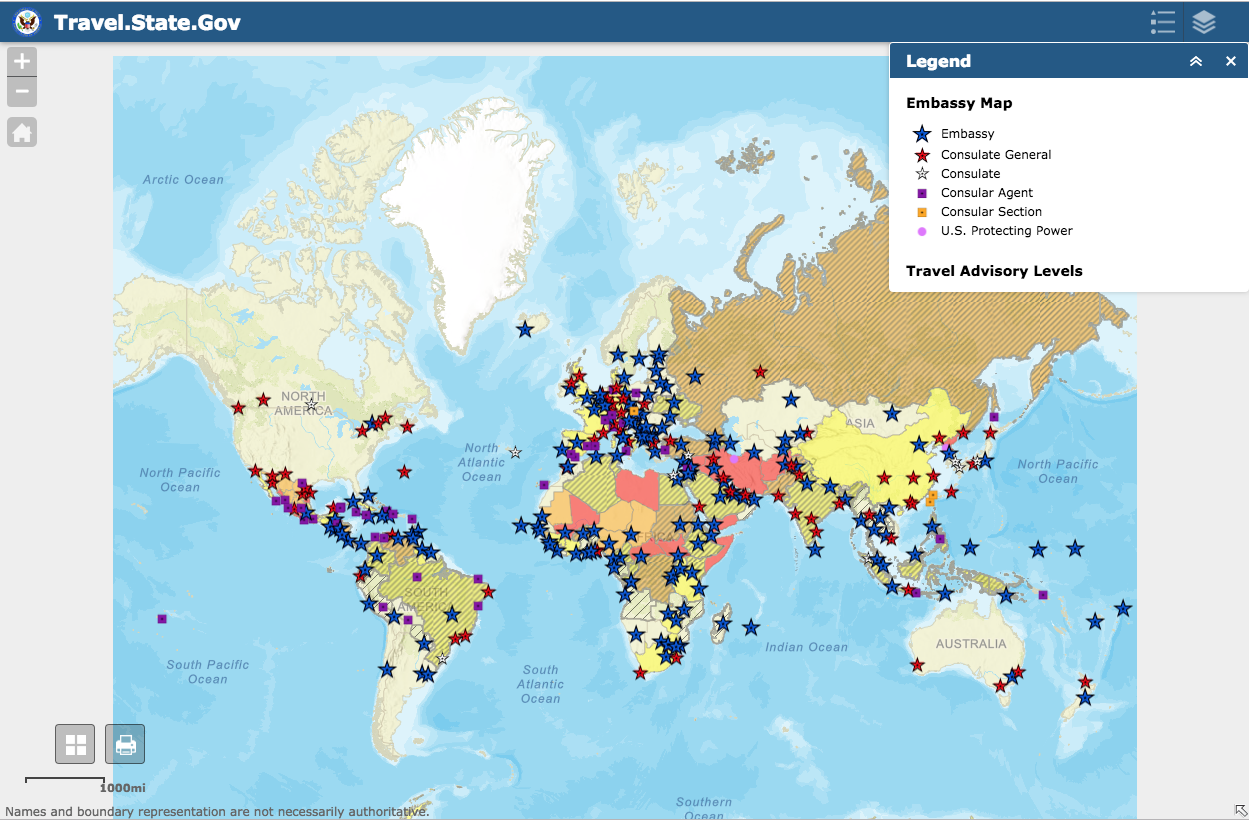Travel Safety: What is a Travel Advisory Anyway?
By Brittany Dismuke, on December 1, 2018
Cover Image Source
First and foremost, research as much as you can before visiting the country. This step allows for all the others to be accomplished!
If you are traveling abroad it is important to always research the area you will be visiting. While knowing about the culture, local customs, and key language phrases are central parts of your trip research and planning, you should also consider the safety of the country you plan to visit. Travel advisories from the Department of State are made specifically for this process and they aren’t just about physical security, they also include weather, disease and civil unrest. Where do you go for this information and what does it all mean? Let’s break it all down.
What is a travel advisory?
A travel advisory/warning/alert “is an official warning statement that is issued by a government agency to provide information about the relative safety of traveling to or visiting one or more specific foreign countries or destinations.” In the United States the government agency is the US Department of State (DOS). You can find these travel advisories by visiting their website.
Are there levels for Travel Advisories? What are they?
Yes, the DOS launched improvements to the Advisory system January 10, 2018 providing four travel advisory levels issued by the US Department of State.
- Exercise Normal Precautions – Lowest advisory level for safety and security. There is some risk in any international travel and the country’s conditions may differ from the US and change rapidly.
- Exercise Increased Caution – Be aware of heightened risk to safety and security.
- Reconsider Travel – Avoid travel due to serious risks to safety and security.
- Do not Travel – This is the highest advisory level due to the greater likelihood of threatening risks. During an emergency, the US Government may be limited in the assistance they are able to provide. Travelers are advised to not go to the country or to leave as soon as they are safe and able to do so.
The specific travel advisory will provide additional advice to travelers to these areas from the Department of State. There are also letters assigned along with the level for a quick reference for the risk in traveling to that country. For example, C is Crime, meaning violent or organized crime is present in areas of the country. To see a key of the letters, visit the website.
Can I sign-up for alerts?
Yes! And it would be recommended to do so, as advisories and conditions in countries are rapidly changing, signing up for the DOS alerts will make sure that you are always current. The DOS offers a couple of options for alerts through their website.
The best option is the Smart Traveler Enrollment Program (STEP) which allows you to sign up and enter your specific trip information to receive emailed alerts and advisories as soon as they are available. You can also check on specific conditions for countries even without a planned trip on their website.
If you stay connected mostly through social media, the DOS posts advisories and alerts to their @TravelGov accounts on Twitter and Facebook. Make sure to follow the pages or turn on post alerts on, as algorithms within those sites can change how you see the messages.
If RSS Feed are your thing, there is an option you'll love as well. The DOS has RSS for alerts, and one for advisories.
You can always check the DOS website for a specific country’s alerts or advisories. It also provides you with additional information including a traveler’s checklist, resources for a crisis or health issues abroad and other helpful links.
The website also provides a color-coded map showing the risk levels, date the advisory is issued for, as well as embassy location information.
What countries are currently listed at a Level 4: Do Not Travel?
At the time of this writing (November 21, 2018) the countries listed for Do Not Travel by the US were: Iraq, Iran, Central African Republic, Syria, North Korea, Mali, Libya, Somalia, Afghanistan, Yemen, and South Sudan. You should check the DOS website for the most current information.
The travel advisory for the country I plan to visit was posted months ago, is it still valid?
You should always do your research on a particular country and safety should be your top priority. If you are concerned that the advisory may no longer be valid, check other countries travel advisories (Canada, UK, etc) and see if they match up or if there is updated information. Checking the websites for international newspapers is also a good source of information on the current climate of the location that you are planning to visit. Check the travel advisory itself to see what the risk is, is it localized to one area, away from tourist destinations and not focused on foreign tourists? There may be less risk to visitors.
What if I still need to/have to go to a country with a travel advisory?
Second, have a few trusted folks at home? Send them a few things:
- Copies of your passport and important travel documents. Keep multiple copies in different bags, in case one is lost or stolen during your travel you have a backup for identification purposes.
- A copy of your itinerary, including contact information of where you will be staying, who you will be staying with or meeting with along the way. If anything should happen either abroad or at home, they will know how to get in contact with you.
- Local Embassy Information. Get the contact information for the local embassy for yourself as well and familiarize yourself what assistance they provide.
Third, register yourself through STEP. Let the DOS know when and where you will be traveling so that you can be reached if an emergency arises.
Fourth, Keep in contact. Time zones and wifi can be hard to get the hang of, but calls, skypes, facebook updates, emails, let your loved ones know where you are and that you are safe while traveling.
Fifth, get travel insurance but be careful about what coverage you are actually getting. Being able to opt out of your trip last minute if things get too bad, is security worth having!
APVI.com urges you to take every precaution necessary when traveling to a foreign country. While crime and safety issues do not have a zip code, research and planning can help you have the safest trip possible. With all the preparation necessary for your trip, why worry about the visa process? Leave it to APVI.com to process your travel documents. We have friendly, knowledgeable staff that will help you every step of the way and get you your documents fast!

